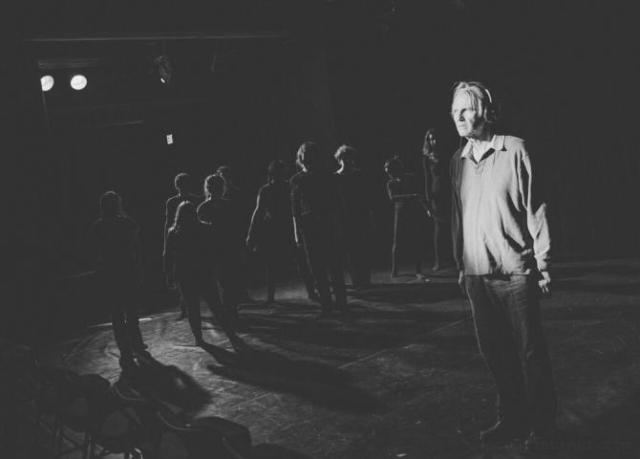
In a Milwaukee High School’s black-box theater, World Stage Theater invites high school students as well as audiences to get a glimpse into the world of Samuel Beckett, one of the 20th century’s most influential writers.
Tackling Beckett is no easy task, either for the performers or audiences. Known for his gloomy look at life, and his belief that “less dialogue is more,” Going Dark: Short Plays of Samuel Beckett brings to life a collection of six short plays. They range from about 15 minutes to three minutes each. The performance stretches just a little over two hours. Assisting the theater students is a group of professional actors. Their goal is to teach the essentials of understanding Beckett as much as to perform onstage. While none of the plays seen here rival Beckett’s best work (such as his most famous play, Waiting for Godot), they do give one a greater perspective on Beckett’s work. In addition, many of these plays have never been seen before in Milwaukee. Given the results of this unique student/professional actor collaboration, the project seems to have worked out pretty well.
Beckett is not for the faint-hearted, and the students deserve a great deal of credit for assuming roles that are often thankless. Consider Rough for Theatre II, which involves three men (or they could be women, since the characters are named A, B and C). Two of the men are dressed in opposite colors: one wears a black suit and tie, while the other wears the same outfit in tan. They are discussing the fate of a third man, who stands quietly on a pedestal in a corner of the stage. On his head, he wears a set of short drapes that frame his face and torso. Combining a window and a human is consistent with Beckett’s “stripped down” approach to playwriting; but it doesn’t require much “acting” by the drape-wearing actor (played by Jacob Ludwig). The other two actors, David Rothrock and Thom Cauley) do a terrific job of delivering Beckett’s snippets of interwoven dialogue. The piece was directed by Kirk Thomsen. For all its complexity, Rough for Theatre II isn’t necessarily the best of the six short plays. That prize comes at the very end of Act II, when renowned actor John Kishline appears in A Piece of Monologue. Much of Beckett’s text has been prerecorded (by Kishline) and we see his facial expressions as he hears his own voice through a set of headphones. With his gray hair slightly mussed and his body covered by a simple, white cotton garment, Kishline reminds one of Ebeneezer Scrooge, waiting at home for a series of ghosts to visit his bedside. But in Kishline’s case, the ghosts are all in his head. He contemplates life and death (mostly death) in thoughts that wash over him like waves. Some of these thoughts are repeated several times during the play. While Kishline stands alone in a stark spotlight, more than a dozen actors can be seen at one end of the stage. They move silently and slowly in choreographed movements that are somehow connected to Kishline’s thoughts. The group moves in unison for most of the play. Kishline pays them no attention. He seems riveted by the outpouring of his own thoughts. In this version, directed by Kirk Thomsen and Posy Knight, Kishline eventually uncovers his ears and begins to speak the words along with the recording. His eyes and face convey nearly all of the play’s emotion. The result is riveting, but also disturbing. Beckett seems to be communicating the message that we all die alone.
The second-best play – if it can be called a play at all – is the production’s first offering. There is no dialogue. Instead, a lone figure begins pacing the stage. He or she is wearing a hoodie, and keeps his/her head down as he/she walks. Eventually, the first person is joined by three others. All are wearing identical outfits. They scurry about as if on their way to an important meeting. As they zigzag to avoid each other, they also stay within the confines of the set’s boundaries.
As with all of Beckett’s work, the play is open to wide interpretation. Perhaps this is a comment on how we see ourselves, going from point A to point B, never acknowledging the others who are on a similar journey. Perhaps it is a criticism of urban life. In any case, the actors in this three-minute piece include: Kirk Thomsen, Josh Perkins, Liz Leighton and Posy Knight, who also directed the piece. The lighting design is especially good, given the limitations of a black-box theater. And a lighting technician really gets a workout in Play, which requires a hand-held, fast-moving spotlight to focus individually on three characters, depending on who is speaking. In this love trio directed by David Rothrock, a man, his wife and his mistress recount the story of their affair. Some of the lighting mishaps add a rare note of humor to an otherwise serious drama.
